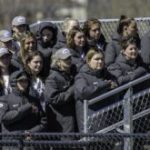Following his father’s death, Frederick was forced to take over the running of the plantation. He made sure that the slaves were treated well and fired anyone who abused them. Then, there was news of a pending war between the North and the South. Then, President Lincoln issued a public declaration that an insurrection existed and called for 75,000 militia to stop the rebellion.
Men from the North and South volunteered in large numbers. Many believed that the war would be over by summer but it dragged on through 1861 and into 1862. Men were no longer willing to volunteer to fight in the war which was growing increasingly violent and so both both the United States and Confederate States enacted conscription in 1862.
The Confederacy was the first to enact compulsory military service. President Jefferson Davis authorized the first Conscription Act on April 16, 1862. This legislation required all white males aged eighteen to thirty-five to serve three years of Confederate service if called. Soldiers already in the military would now be obligated to serve an additional twenty-four months.
Mrs. Livingston worried that Frederick would be forced to fight this time but, five days later, the Confederate government passed the Exemption Act, which excused from military service select government employees, workers deemed necessary to maintain society, such as teachers, railroad workers, skilled tradesmen, ministers and owners of twenty or more slaves. That meant that Frederick was exempt because he was now the owner of more than twenty slaves.
Frederick was relieved too because he didn’t want to fight for the south’s right to assert their authority over the federal government so they could abolish federal laws they didn’t support, especially laws which interfered with their right to keep slaves and take them wherever they wished. The Southern states also wanted to take slavery into the western territories but the North was committed to keeping them open to white labor alone.
Frederick was well aware that racism existed in the North. He heard reports of blacks faced discrimination in many forms and that segregation was rampant, especially in Philadelphia, where they were excluded from concert halls, public transportation, schools, churches, orphanages, and other places. Although the North was pushing for slavery to be abolished, they were just as racist as the South. He wanted the North to win only because it meant freedom for Hester and all slaves.
He knew that if his father were still alive, he would want the South to win and would have fought if he weren’t exempted. He would have forced Frederick to enlist and fight or perhaps even die for a cause he didn’t believe in. It was ironic that the one thing he was adverse to doing–running the plantation–was the very thing which saved his life. What would have become of his mother and Hester if he had died in battle?
He thought of the thousands of eligible men who refused to serve. Some were draft dodgers and others were conscientious objectors while others purchased substitutes to fight for them. If his father were still alive, he would have refused to fight and be one of the conscientious objectors. He would have used his religion and his stance against slavery to do so. It would have been better than being a deserter. There were many of those from the armies of the North and South who tried to blend into the general population.
The war lasted for 4 years, 1 month and 2 weeks. The South had lost the war and slavery was abolished by the Thirteenth Amendment in 1865. Most of the plantations in the Charleston area were looted and damaged by Union forces under the General Sherman’s leadership. Magnolia Plantation and Middleton Place were burned to the ground and large sections of the city of Charleston lay in ruins after the war.
Cherryville was one of the plantations which survived. Union soldiers burned most of the Caldwell’s house, leaving only the south wing and gutted walls of the north wing and the main house. The Caldwells abandoned the plantation and left Charleston after freeing all of their slaves. Although Frederick gladly freed the slaves, several stayed, including, Joseph and Phillis.
Walter, Frederick’s valet, returned to Cherryville. Mr. Livingston had sold him for allegedly harassing Nancy. The accusation, of course, had been false. Frederick had told his father that he didn’t want another valet and his father, had said, “Suit yourself.”
Frederick was delighted to see his valet and gave him a warm welcome. “I came back ’cause of yo, Master Frederick,” Walter said. ”If yo father was still alive, I won’t a come back. I go somewhere else.”
“Well, I’m delighted to have you back, Walter. And, please, don’t call me Master. You’re a free man now.”
A few days later, in the presence of his mother, Walter and Phillis, he and Hester married in a self-uniting marriage without an officiant. ”According to the law, we’re not married but, in God’s eyes, we are,” Frederick said to Hester. He had bought identical gold rings which they put on each other’s hand as they spoke their vows of love and commitment.
On their wedding night, Frederick, after stripping and taking off Hester’s clothes, pulled her against him, his face flushed with wanting her. ”Oh, Hester, my darling,” he muttered thickly. ”Now, I can finally show you how much I love and want you.” Then, he kissed her for the first time.
Hester kissed him back, her heart bursting with love for him. It still felt surreal because he loved her instead of one of the many white young ladies who had vied for his affections. And he married her even though she could never give him children. He had told her, “It doesn’t matter to me that we won’t have children. I love you and I want to spend the rest of my life with you. I want nothing more than to be your husband.”
That brought joy to her heart. He loved her despite the fact that she was barren. She knew that if he had married someone else, she would have asked to be set free or to be sold to the Caldwells. But, thankfully, he had married her and tonight they were going to give themselves to each other. She clung to his arms as they kissed passionately.
He broke off the kiss to press his mouth urgently against the side of her neck before he kissed her heaving chest. She moaned when he cupped one of her breasts and fastened his mouth to the nipple. Reaching up, she clutched his head, her fingers digging into his scalp. The sweet sensation lasted for a while, then, he released that breast and cupped the other one. The nipple was in his warm mouth. Hester’s eyes were closed and her lips were parted.
She felt his mouth leave her breast, press kisses down her stomach. Then, she felt his hands grip her buttocks and she gasped when she felt his tongue thrust between her legs. Her head fell back and she grasped his head, moaning loudly and driving him wild. Consumed with desire, he teased her until she convulsed against him.
Panting, he rose to his feet and cupping her face between his hands, he hungrily devoured her mouth. She clung to him, her legs feeling weak and ready to give out on her. Then, he raised his head and picked her up. He carried her over to the bed and set her down on it. She lay there on her back, breathing heavily, her body still tingling from his lips and tongue.
He gently parted her legs and moved between them. Then, he entered her, groaning deeply at the sensation of being inside her. This was the first time he was having sex and he was happy that he had saved himself. Hester was going to be his first and last. He closed his eyes and began to move his hips. He felt her legs wrap around him and her hands on his back. That inflamed him more and he moved his hips faster and thrust them harder.
The lovemaking lasted for a while, the pleasure intense and then, they both came. He collapsed on her, still inside her. They still like that for a while and then, he rolled onto his back. She turned on her side and snuggled up to him. He turned his head and kissed her on her forehead. ”I love you,” he murmured.
“I love you too.”
Minutes later they fell asleep. The next morning when he woke up, Hester was gone. He stretched and smiled. He lay there for a little while and then, got up. Hester had drawn his bath for him. The water was still hot. A short while later, he went down and had breakfast on the terrace. He wanted Hester to join him but she was busy with her chores. ”I want us to start having breakfast together,” he told her. ”We’re husband and wife now.”
“Tomorrow,” she promised.
“Good.” She was about to leave, when he caught her by the waist and pulled her down onto his lap.
“Frederick!” She struggled against him, albeit not much. ”Let me up,” she said, looking into his blue eyes which made her heart beat faster.
“Not until you give me a good-morning kiss.”
She stared at him for a moment and then, she kissed him on the lips. When she drew back, he smiled. ”You’re free to go now.”
She got up. After glancing at him and shaking her head, she hurried off, smiling broadly and humming to herself. Frederick finished his breakfast, an expression of bliss on his face.
Mrs. Livingston took care of running the house while Frederick, Walter, Joseph and the other former slaves worked the farm. This time, the men were paid wages in addition to be housed in decent quarters. They were treated well and were free to leave any time they wanted.
Hester continued to attend to Mrs. Livingston while Phillis took care of the sewing and laundry while the other women did the housekeeping. There were at least two cooks. The plantation was up and running again.

Then, something rather unexpected happened. Hester was pregnant. When she told Frederick, he was thrilled. ”It’s a miracle,” he said. It was a miracle because Hester was supposed to be barren.
“God closed my womb because he wanted you to be the father and for this child to be free.”
“Yes. He wanted our child to be conceived in love and in freedom.”
“If it’s a boy, we call him Samuel and if it’s a girl, we call her Hannah.”
Their first child was a boy and their second, a girl. Mrs. Livingston loved her grandchildren, especially, Samuel because he reminded her so much of Frederick. She lived to see him grow up to be a fine young man, bright and desirous to be a lawyer and her granddaughter, Hannah blossom into a lovely young lady before she died. They buried her beside Mr. Livingston.
Shortly after Mrs. Livingston died in 1886, there was an earthquake, fortunately, not much damage was done to the house at Cherryville. Samuel left Cherryville to go to New York to practice law while Hannah went to Chicago where she was trained to be a nurse. Frederick and Hester spent the rest of their years at Cherryville. Their son, Samuel became a successful lawyer and married a black woman whose father was also a lawyer.
Hannah left Chicago and went to New York where she worked as nurse at a black hospital. There she met, fell in love with and married a black doctor. Frederick and Hester were blessed with six grandchildren and three great-grandchildren. Then, sadly, Hester passed away and then, Frederick, the following day. His heart simply gave out because he couldn’t live without his beloved wife. He was buried beside his darling Hester on the grounds of Cherryville.
Cherryville became a school for freed blacks. On its walls were the portraits of Frederick Livingston and his wife, Hester. It was their dream to educate blacks so that they could have a better chance in life. It was run by the children and grandchildren of Cherryville’s former slaves. It seemed like God’s blessings were upon the institution because it is still standing to this day.
As for the Caldwells, George Caldwell died shortly after his daughter, Daphne married John Lewis who had survived the war but had suffered an injury which left him lame in one leg. He was with her when she attended Frederick’s funeral and consoled her as she wept over her friend’s grave. “He was my dear, dear friend,” she cried. ”I will miss him terribly.”
Frederick had been at her father’s funeral. His presence had given her great comfort. When Hester passed away, she had wanted to be there for him but her daughter, Elizabeth had a stomach ache and begged her not to leave her. She had asked Settie to attend in her place and to take some flowers to put on the grave.
The Caldwell plantation survived but it was devastated by the loss of slave labor and the fact that a substantial percentage of the military-age white male population had died during the war. With no one to run or work the plantations, many of them fell into disrepair or were sold off. Determined that his planation should continue on, George Caldwell relied on tenant farming and cheap labor from former slaves. Many former slaves were forced to return to work at plantations as freedman, tenant farmers and sharecroppers because it was difficult to find work elsewhere in the now impoverished Lowcountry.
After Daphne married John Lewis, she moved to Mount Pleasant to live on his family’s estate. Neither the house nor the estate had been touched in the war because the town surrendered to the military authority and was promised protection to persons and private property. The young couple had four children. Mr. Caldwell visited frequently until he fell ill. After he died, his wife, Effie remarried.
Effie’s second husband took over running the Caldwell plantation until the earthquake struck in 1886, damaging much of the property. The couple left and moved to Atlanta. The late Mr. Caldwell’s brother, Brannon made it to Liberia, a permanent homeland for freed U.S. slaves where he settled down with his wife, Nancy. He had written his brother, George to inform him. George had intended to share this news with Mrs. Livingston as promised but he fell ill and died shortly afterwards. Frederick and Mrs. Livingston attended the funeral.
His wife, Effie found the letter and she tore it up and threw in the fireplace. She didn’t tell Daphne about her uncle. Brannon never knew that his brother had passed away until he wrote Daphne and she informed him. He mourned his brother and when Nancy and he had their first child, he named him, George.
Brannon and Nancy never returned to America. They spent the rest of their lives in Liberia where they raised their five children and told them about the evils of slavery and the goodness of God who had brought them out of America before the civil war began and had brought them safely to Africa.
Even though the South had lost and the slaves were freed, life in America would have been hard and intolerable for Nancy and him. They were better off there in Liberia where they were free to live as husband and wife and raise their children.
Brannon and Nancy began to regularly attended the minister’s church, the United Methodist Church which was started by free slaves who had returned to Africa. All of their children were Christened there and later married there. Daphne never visited her uncle because she didn’t want to leave her husband and their children but she frequently wrote him until his death.
Many years later, her eldest son, Wyatt visited Liberia and his great uncle Brannon’s grave. He found his widow, Nancy to pay his respects and met his second cousins, George, Abigail, Daniel, Simon and Phoebe. When Wyatt met Abigail, he decided that he would move to Liberia after he finished his final term at the University of South Carolina. While he was there, he and Abigail spent a considerable amount of time together and true to his promise, the year after he graduated, he returned to Liberia.
He began a new life in Liberia as a politician and married Abigail. His parents couldn’t attend because his father, John was too weak to travel Daphne couldn’t leave him. Shortly after the wedding, John passed away one afternoon when he was propped up in his favorite chair. He was buried beside his mother. Daphne mourned for him and wore black for several years.
Nancy lived to see her first grandchild, a boy whom they named Brannon after her beloved husband. Then, she died quietly in her sleep and was buried beside her husband. Their children visited frequently and there were always fresh flowers on the graves.
Wyatt’s mother, Daphne finally visited Liberia and spent two months with him and his wife, Abigail. Years later, before she died, she wrote a memoir about her dear uncle Brannon which included her childhood memories of him, when he was living on her family’s plantation and the beautiful love story between him and Nancy, the slave woman whom he had married and brought to Liberia where they were free to live as husband and wife.
Years later, the memoir was published. It was dedicated to the loving memory of Brannon Caldwell, a beloved uncle, husband, father and grandfather. Not long after, a book was written about the Livingstons and life at Cherryville, including the love story of Frederick and Hester. It was based on different personal accounts and stories. It became a best-seller and was later adapted to a mini-series for television, garnering several awards.
Cherryville plantation became famous due to the publicity and many families wanted to enroll their children in the school but it remained a school for blacks. At the front of the building, there was a plaque on which was written this W.E.B Du Bois quote, ”Education and work are the levers to uplift a people.” Frederick’s and Hester’s children, grandchildren and future generations were determined that the school would remain an institution dedicated to the education and future of blacks who were being denied these very rights elsewhere in the country.
This concludes the series about the Livingstons, their slaves, Cherryville plantation and the other people whose lives were intertwined with theirs. Slavery has ended but, sadly, racism and discrimination still exists today.
Sources: Encyclopedia Arkansas ; PBS; PBS; Encyclopedia; American Battlefield Trust; Local Long Branch; Boundless; Politico; Medium; Tomps SC; University of South Carolina; Alternative History




